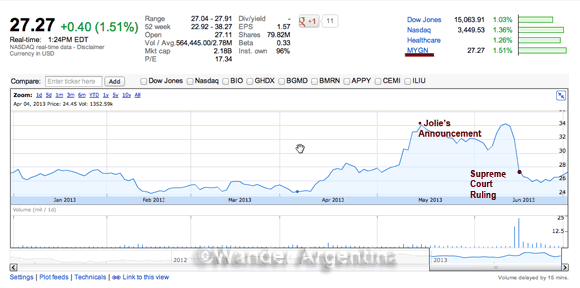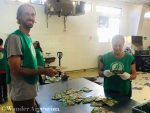Hollywood actress Angelina Jolie made history in May this year when she published an op-ed in the New York Times revealing that she had a double mastectomy and subsequent reconstructive surgery after testing positive for a BRCA gene mutation associated with high rates of breast cancer.
The mainstream press hailed Jolie’s revelation as a brave move that helped to bring awareness to breast and ovarian cancer gene testing and preventative mastectomies. Others saw it as a publicity stunt that served to boost the stock of Myriad Genetics, the company that has owned the patents for the BRCA1 and BRCA2 gene sequences since the mid 1990s. Ownership of a gene patent entitles a company to prevent other entities from testing or researching the gene, or to charge royalty fees for its use.
According to the U.S. National Cancer Institute less than 5% of women have the BRCA genetic mutation that can lead to the development of breast or ovarian cancer, but those women have a 60-80% chance of developing breast cancer. Nine to twelve percent of women in the general population will develop breast cancer in their lifetime.
In the United States, a Myriad Genetics BRCA diagnostic test costs US$3,000-4,000. Even those with insurance will most likely have out of pocket expenses of $300 upward to get the test.
BRCA Tests Free through Argentine Health System
In Argentina the test is free for all women who are considered at risk for the gene mutation. Since Jolie’s announcement, requests for the test have increased at hospitals in Argentina (Spanish).
Women visiting Argentina who would like to get the test should plan to be in Argentina for several weeks or even months to get signed up, processed in the public health system and go through genetic counseling that precludes testing.
The requisites to receive the test in Argentina follow the normal established guidelines:
• If an immediate family member had breast or ovarian cancer.
• If three or more members of the extended family had breast or ovarian cancer.
• If any male individual in the immediate or extended family had breast cancer.
Medical Tourism for Gene Testing?
Argentina welcomes thousands of medical tourists per year who come for low-cost, high quality dentistry and cosmetic surgery. American women who are interested in genetic testing for cancer who don’t have it covered by insurance at home may consider taking a vacation and essentially paying for their trip by taking advantage of free or lower cost testing in Argentina.
Those who wish to get the test via the public health system need to show up early in the morning at Hospital Rivadavia’s National Genetic Center to request an appointment and get the ball rolling. Another alternative for those staying in Argentina a while is to get on an insurance plan, which will have a very modest co-pay — usually under US$10.
Visitors with more money than time could opt to purchase the test privately in Argentina at a cost of AR$1,400 (less that US$ 200 at the blue rate, as of June 2013) for the BRCA1 y BRCA2 mutation test, which is most prominent in Ashkenazi Jewish women. A more complete test for for the general population can reach up to AR$12,000 (US$1,500 at the blue rate as of June 2013).

Preventative Mastectomy and Reconstructive Surgery
While some women who test positive, as Jolie did, may opt for prophylactic mastectomy, the procedure is not common in Argentina.
Women diagnosed as carriers of the gene here will most likely be given instructions to modify their lifestyle and be given over the counter medications including chemopreventive therapy.
With the high number of skilled plastic surgeons in Argentina, carriers of the gene mutation certainly have the option to receive a preventative mastectomy and reconstructive surgery here, even if it is usually not prescribed. It is unlikely that an Argentine insurance plan would cover the entire procedure, but it would cost much less out of pocket than in the U.S.
Supreme Court Ruling on Gene Patents
Myriad Genetics (MYGN) stock did soar after Jolie’s announcement but the corporate victory was short lived. On June 13, the U.S. Supreme Court ruled that human genes cannot be patented. This represents a victory for cancer patients, doctors and researchers and may eventually result in a lower price tag for the BRCA gene mutation test in the U.S. Until then, uninsured or underinsured American women might want to make this health check-up a whole lot more fun by considering a medical vacation to Argentina.



